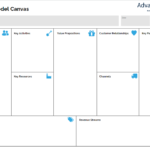Navigating the complexities of starting and running a business can be daunting, especially for SMEs and startups with limited resources. That’s where the Business Model Canvas (BMC) comes in. A strategic management tool, the BMC offers a visual chart to develop, describe, challenge, and pivot your business model. This guide will walk you through what it is, how to complete it, how to use it, who should use it, and the questions you should ask when working on it.
What is the Business Model Canvas?
The Business Model Canvas is a one-page visual chart divided into nine essential building blocks. These represent the foundational elements of a business:
- Key Partnerships: Who helps you operate?
- Key Activities: What do you do daily to create value?
- Key Resources: What do you need to operate?
- Value Propositions: Why would customers choose you?
- Customer Relationships: How do you interact with customers?
- Channels: How do you deliver the value proposition?
- Customer Segments: Who are your customers?
- Cost Structure: What are the business’s main costs?
- Revenue Streams: How does your business make money?
To delve deeper into a practical application, check out how Netflix utilizes the Business Model Canvas: Netflix Business Model.
How to Complete the Business Model Canvas:
- Start with a Blank Canvas: Begin with the template below or create you own on a wall.
- Brainstorm: Gather your team and brainstorm each of the nine sections. Sticky notes are handy as they allow easy adjustments.
- Prioritize: Not all points raised during brainstorming will make it to the final canvas. Focus on the most pivotal elements.
- Iterate: As your business evolves, so should your BMC. Regularly review and update it.
Using the Business Model Canvas:
- Business Strategy Formation: The BMC helps visualize your entire business model, making it easier to identify gaps and areas of improvement.
- Pivot Evaluation: For startups in the MVP phase, the BMC can be a tool to assess the feasibility of a pivot.
- Stakeholder Communication: The BMC provides a simplified view, making it easier to communicate your business model to stakeholders, investors, or new team members.
Who Should Use the Business Model Canvas?
While the BMC is versatile enough for any business, it’s particularly beneficial for:
- Startups: When launching, resources are limited. The BMC provides clarity without the overhead of detailed business plans.
- SMEs looking to pivot or expand: The visual nature of the BMC can help identify areas ripe for innovation.
- Innovative Teams within Larger Companies: Teams looking to launch a new product or explore a new market can benefit from the streamlined approach of the BMC.
Questions to Ask When Completing the BMC:
- Key Partnerships: Who are our suppliers? Who else provides value to our operations?
- Key Activities: What are the core tasks crucial for our business?
- Key Resources: What physical, human, intellectual, or financial resources are essential?
- Value Proposition: What problem are we solving? Why choose us over competitors?
- Customer Relationships: How do we handle customer service? Is there a community aspect to our model?
- Channels: What are our distribution and sales channels?
- Customer Segments: Are there niche markets we are catering to? Are there segments we haven’t explored?
- Cost Structure: What are our major cost drivers? Are there areas where we can be more cost-effective?
- Revenue Streams: How do customers pay us? Is there potential for other revenue streams?
Further insights and practical applications of the BMC can be found here: The Power MBA’s Guide.
Free Learning Resources


Click Here To Download: The Business Model Canvas
Send download link to:
Conclusion:
The Business Model Canvas is an indispensable tool for SMEs and start-ups. Its visual and simplified nature provides clarity in the chaotic early days of a business, ensuring that foundational elements are addressed. So, whether you’re starting out, looking to pivot, or exploring new markets, the BMC is the tool to help you visualize, strategize, and realize your business ambitions.



